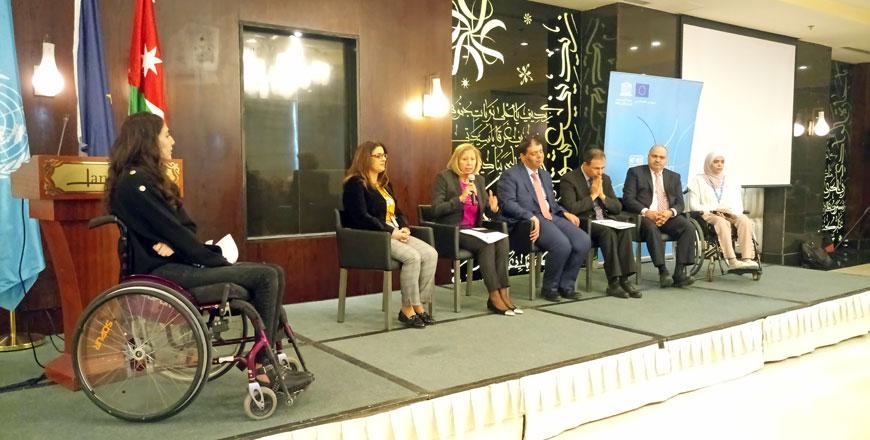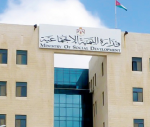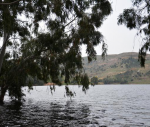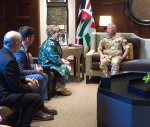You are here
More collaborative efforts still needed to improve lives of PwD — Prince Mired
By Ana V. Ibáñez Prieto - Dec 04,2018 - Last updated at Dec 04,2018

Attendees of the UNESCO Amman office’s celebration of the International Day of Persons with Disabilities (Photo by Ana V. Ibáñez Prieto)
AMMAN — “We must put persons with disabilities [PwD] up in the priority ladder of our country, and it is our duty to raise the level of discussion and make sure that decision makers understand the relevance of this issue,” HRH Prince Mired said on Monday.
“Unfortunately, the vast majority still see PwD as second class citizens and we have to change this all together,” the Prince said.
“The new law on the rights of PwD passed in 2017 is a step in this journey, but now the challenge we have ahead is to ensure its proper implementation and to make sure that all government entities and civil society take it seriously,” Prince Mired, who is also the president of the Higher Council for the Affairs of Persons with Disabilities (HCD), said.
The Prince’s remarks came during a UNESCO Amman office’s celebration of the International Day of Persons with Disabilities, which was held in partnership with the European Union under the theme of “Promoting PwD inclusion in Jordan: 2030 Agenda and Leaving no one Behind”.
“In the summer of 2009, I was in an accident that put me in a wheelchair, and I felt like I could not do any of the things I used to do. But then I lived abroad and I realised that we can live in a world where PwD live the same way as the rest of the people, and when I came back to Jordan, I decided that I would do anything that was in my hand to enhance the experience of PwD in the Kingdom,” founder of the platform Accessible Jordan Aya Aghabi told attendees of the celebration.
Determined to continue living her life as normally as any other person, 26-year-old Aghabi said she decided to create the platform as an online guide to all the places accessible around Amman, and other destinations in Jordan.
All the accessibility-friendly spots across the Kingdom are listed on the platform, “all with the aim of making it easier for any person with disabilities in Jordan to enjoy their daily lives like anyone else”.
“We started back in 2012 with the objective of promoting inclusion by crowdsourcing information about accessibility of places for PwD in Jordan to be able to have an independent life,” she told attendees, noting that the platform’s goals are “to raise awareness on PwD challenges, to improve accessibility by offering solutions and to create a database of all accessible places”.
“To build more resilient societies, we must place the rights of those with disabilities at the heart of our efforts to enable every woman and man to make the most of opportunities for personal fulfilment,” UNESCO Representative in Jordan Costanza Farina said.
The official recognised the “acute” challenges faced by PwD in Jordan and reaffirmed UNESCO’s commitment to unifying efforts and harnessing the potential of youth, commending “the ongoing hard work” of the HCD and the efforts of Aghabi and Accessible Jordan.
For her part, head of cooperation of the EU Delegation to Jordan, Corinne Andre, stressed that “disability has always been regarded as an issue of protection, but we shall shift to a way of thinking that understands what we are putting at risk if we don’t acknowledge the potential of PwD in our societies”.
The official also pointed to “the EU’s duty to highlight disability as a human rights issue, and to make sure that all EU financial instruments are used to improve their situation”.
Prince Mired announced that a meeting later this month will be held in order to address the PwD issue in Jordan in the presence of Prime Minister Omar Razzaz and representatives of all ministries.
Related Articles
AMMAN — The Ministry of Public Works and Housing, in cooperation with the Higher Council for the Rights of Persons with Disabilities (HCD),
AMMAN — HRH Prince Mired, the president of the Higher Council for the Affairs of Persons with Disabilities (HCD), on Thursday discussed seve
AMMAN — HH Prince Mired, president of the Higher Council for the Rights of Persons with Disabilities (HCD), has held a series of meetings wi














